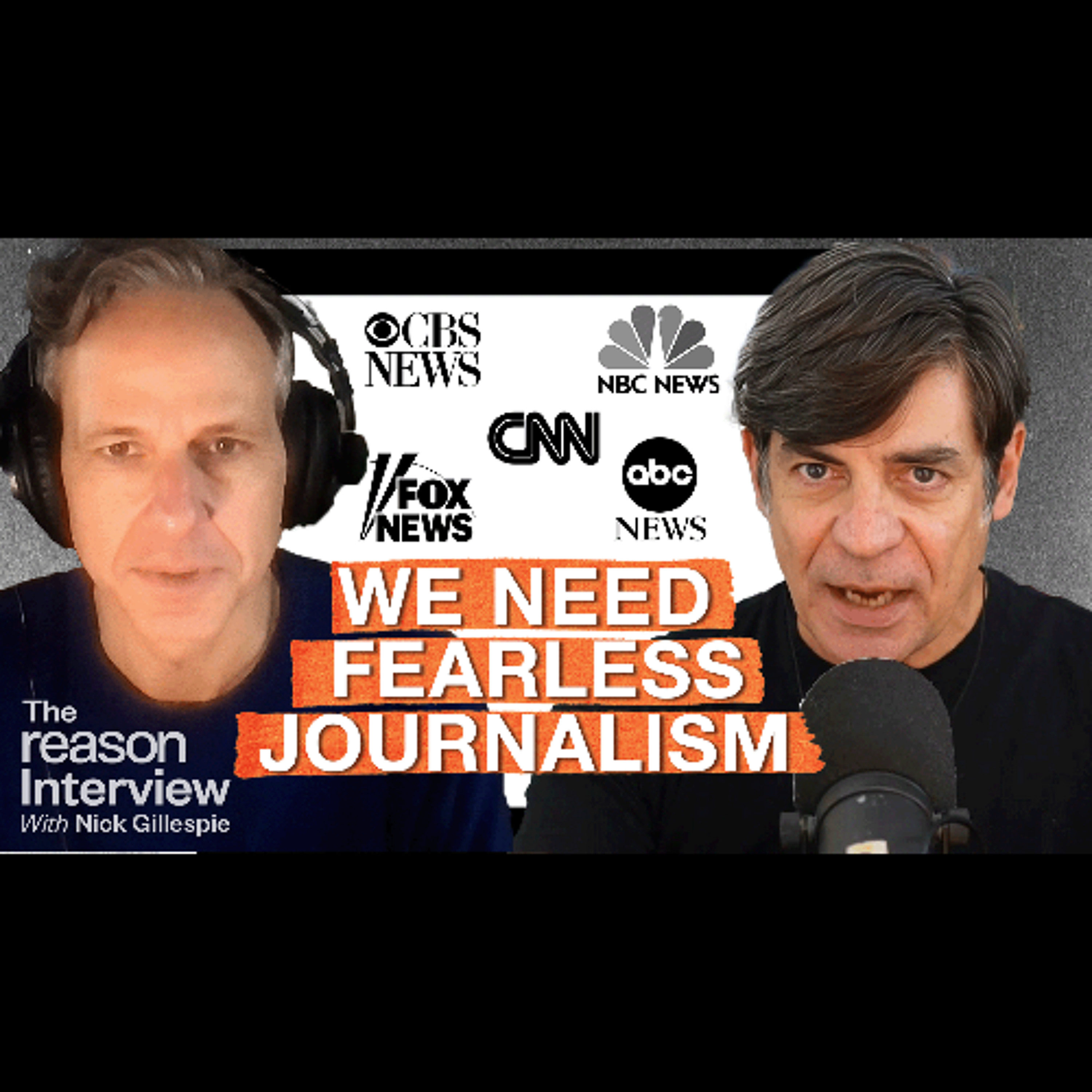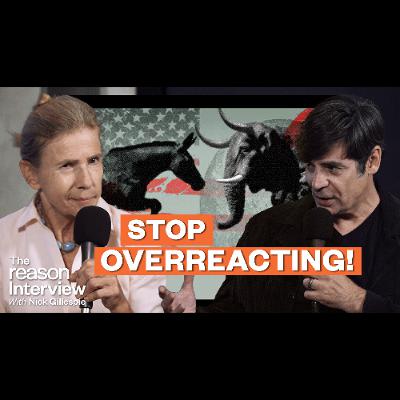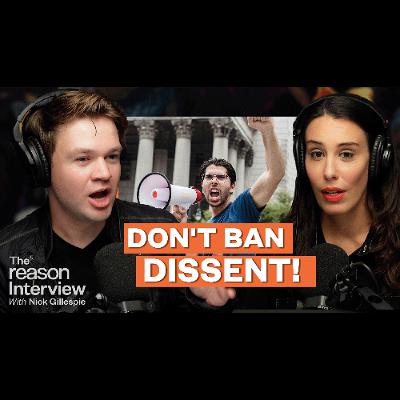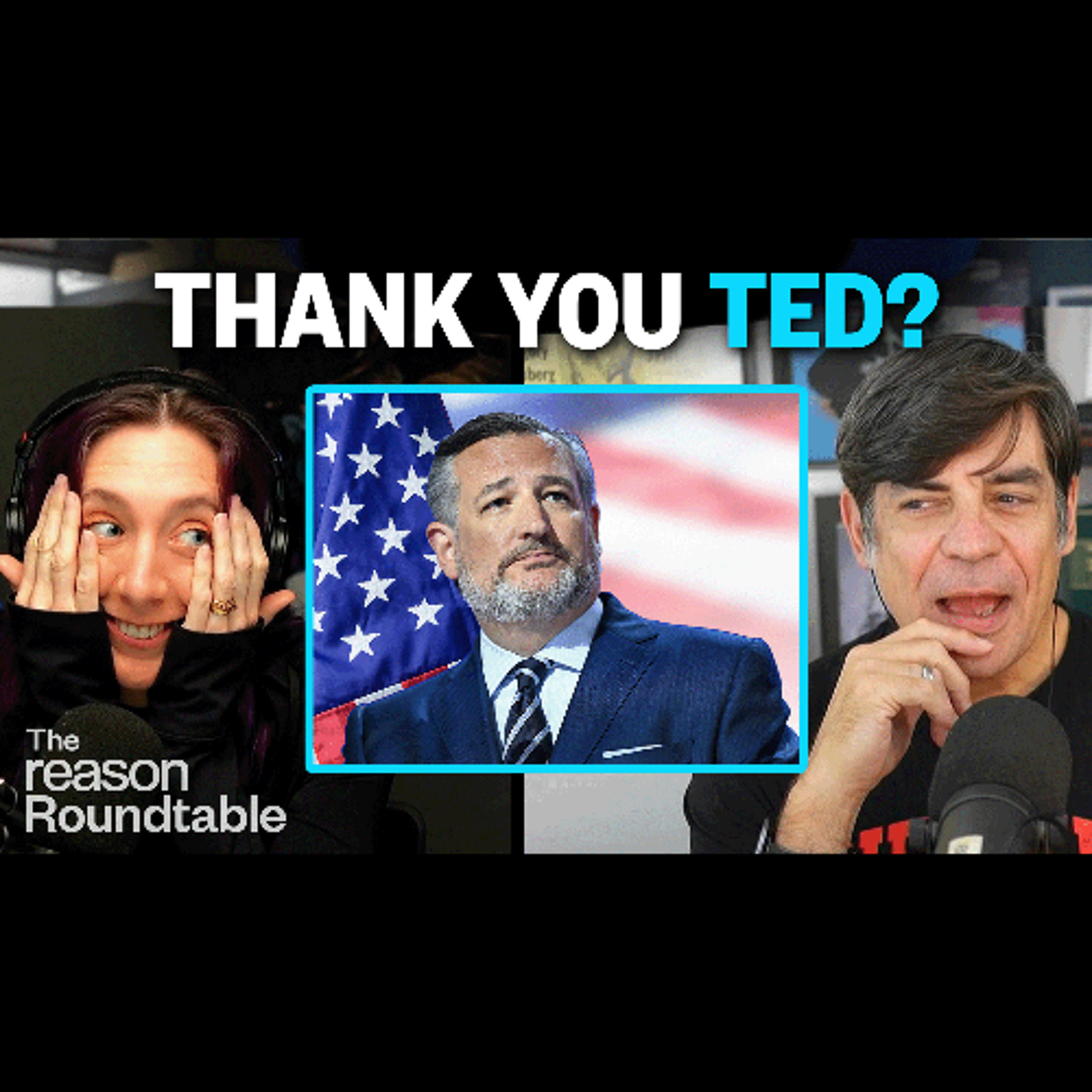Discover Reason Podcasts
Reason Podcasts
Reason Podcasts
Author: Reason Podcasts
Subscribed: 1,166Played: 145,390Subscribe
Share
© All rights reserved
Description
Founded in 1968, Reason is the planet's leading source of news, politics, and culture from a libertarian perspective. Our podcast offerings include:
The Reason Roundtable
Every Monday, the libertarian editors of the magazine of “Free Minds and Free Markets”—Matt Welch, Nick Gillespie, Katherine Mangu-Ward, and Peter Suderman—discuss and debate the week’s biggest stories and what fresh hell awaits us all.
The Reason Interview with Nick Gillespie
Want to know what comes next in politics, culture, and libertarian ideas? Reason’s Nick Gillespie hosts relentlessly interesting interviews with the activists, artists, authors, entrepreneurs, newsmakers, and politicians who are defining the 21st century.
The Soho Forum Debates
Reason presents a libertarian-themed debate series recorded monthly before a live audience in New York City. Moderated by former Barron's Economics Editor Gene Epstein, the Soho Forum features Nobel prize winners, radical thinkers, and other public intellectuals facing off over the future of bitcoin, veganism, sex work, illegal drugs, electric vehicles, abortion, robotics, government debt, and other controversial topics.
The Reason Roundtable
Every Monday, the libertarian editors of the magazine of “Free Minds and Free Markets”—Matt Welch, Nick Gillespie, Katherine Mangu-Ward, and Peter Suderman—discuss and debate the week’s biggest stories and what fresh hell awaits us all.
The Reason Interview with Nick Gillespie
Want to know what comes next in politics, culture, and libertarian ideas? Reason’s Nick Gillespie hosts relentlessly interesting interviews with the activists, artists, authors, entrepreneurs, newsmakers, and politicians who are defining the 21st century.
The Soho Forum Debates
Reason presents a libertarian-themed debate series recorded monthly before a live audience in New York City. Moderated by former Barron's Economics Editor Gene Epstein, the Soho Forum features Nobel prize winners, radical thinkers, and other public intellectuals facing off over the future of bitcoin, veganism, sex work, illegal drugs, electric vehicles, abortion, robotics, government debt, and other controversial topics.
1372 Episodes
Reverse
The Reason Interview with Nick Gillespie goes deep with the artists, activists, entrepreneurs, policymakers, and visionaries who are making the world a more libertarian—or at least more interesting—place by championing free minds and free markets.
Today's guest is Katie Herzog, co-host of the popular Blocked & Reported podcast and author of the paradigm-shattering new book Drink Your Way Sober. Katie writes about her and other people's experiences with The Sinclair Method—a medication-assisted approach to alcoholism where you use one drug to counter problematic use of another. Her story—and the cutting-edge research and treatment she reports on—upends just about everything we think we know about drug use, recovery, and autonomy.
She talks with Nick Gillespie about naltrexone, the drug that helped her retrain her brain, why Alcoholics Anonymous works for some people but not for others, and how modern medicine is finally catching up to the idea that we should treat adults like adults when it comes to what we put in our bodies.
They also get into the insane cancel culture politics that gave rise to her and Jesse Singal launching the Blocked & Reported podcast in 2020, whether we've passed peak woke, and if conservatives are now simply presiding over their own version of cancel culture.
Previous appearance: Katie Herzog and Jesse Singal on Left-Wing Cancel Culture, June 17, 2020.
0:00—Introduction
1:34—What is the Sinclair Method?
6:59—Herzog's experience with alcoholism
15:50—Sexuality, self-identity, and self-loathing
22:22—Recognizing addiction and the myths of willpower
27:43—Alternatives to Alcoholics Anonymous
35:03—Herzog on differences in weed and alcohol use
38:44—Beta-blockers for overcoming anxiety
43:51—Transgenderism in media and cancel culture
58:29—Tolerance vs. agreement
Subscribe at YouTube: http://youtube.com/reasontv
Like us on Facebook: https://www.facebook.com/Reason.Magazine
Follow us on Twitter: https://twitter.com/reason
Visit the archive: https://reason.com/tags/reason-podcast
This week, Reason editors Peter Suderman, Katherine Mangu-Ward, and Matt Welch are joined by the editor in chief of The Argument, Jerusalem Demsas, to discuss the end of the government shutdown and what Democrats actually gained from it. They examine the renewed focus on Obamacare subsidies and how both parties are struggling to articulate a coherent health care vision that moves beyond stale talking points.
The group then turns to Zohran Mamdani's win in New York and what it reveals about the uneasy overlap between the abundance movement and the rising progressive wing of the Democratic Party. The panel digs into President Donald Trump's talk of $2,000 tariff "dividends," and whether it undermines his claim that affordability is "a con." They also examine the differences and similarities between modern-day liberals and libertarians. A listener then asks whether fixing America's broken health care system should start with reforming insurance or dramatically expanding the supply of doctors.
0:00—What did Democrats gain from the government shutdown?
19:34—Obamacare subsidies and healthcare in the spotlight
26:30—The abundance agenda vs. socialism
41:34—Tariff dividend checks and the affordability "con"
46:14—Listener question on health insurance
57:07—Difference between liberalism and libertarianism
1:13:11—Weekly cultural recommendations
Subscribe at YouTube: http://youtube.com/reasontv
Like us on Facebook: https://www.facebook.com/Reason.Magazine
Follow us on Twitter: https://twitter.com/reason
Visit the archive: https://reason.com/tags/reason-podcast
Nick Gillespie speaks with Dr. Wolf von Laer of Students for Liberty, and Sean Themea of Young Americans for Liberty about how campus activism may change after the murder of Charlie Kirk. They discuss how the tragedy has affected their organizations, what it means for the future of student organizing, and how libertarian ideas about free expression and individual rights fit in today's campus climates.
Subscribe at YouTube: http://youtube.com/reasontv
Like us on Facebook: https://www.facebook.com/Reason.Magazine
Follow us on Twitter: https://twitter.com/reason
Visit the archive: https://reason.com/tags/reason-podcast
The Reason Interview With Nick Gillespie goes deep with the artists, entrepreneurs, policymakers, and visionaries who are making the world a more libertarian—or at least a more interesting—place by challenging worn-out ideas and orthodoxies.
Today's guests are Oscar-nominated filmmaker Jon Shenk and former Navy SEAL Marcus Capone. Shenk is co-director, with Bonni Cohen, of the new Netflix documentary In Waves and War, which follows three former Navy SEALs as they use psychedelic-assisted therapy to deal with post-traumatic stress disorder and traumatic brain injuries related to their service.
Capone is one of the three main figures in the film. He first used the ultra-powerful substances ibogaine and 5-MeO-DMT in 2017 and is the co-founder with his wife Amber of VETS, a nonprofit that helps veterans access psychedelic therapies. He's also CEO of TARA Mind, a company seeking to expand the use of psychedelic-assisted mental health therapies for all Americans. He is featured in the 2023 Reason documentary Welcome to the Psychedelic Renaissance.
They talk with Gillespie about why so many veterans and everyday Americans could benefit from psychedelic therapy and discuss the challenges of depicting both the grim realities of war and the otherworldly experiences of tripping on ibogaine, which some call the "Mount Everest of psychedelics." They also discuss why the Trump administration and an unlikely bipartisan group of legislators may well help usher in an era of legalized psychedelics.
0:00—Introduction
1:40—The reality of war
10:34—Documenting war for film
21:05—The psychological toll of the Afghanistan War
31:23—Health care for veterans and ibogaine treatment
36:14—Amber Capone and the importance of veteran spouses
40:15—The psychedelic experience of ibogaine
44:16—Stanford University study on ibogaine
51:49—Visualizing the psychedelic experience
55:37—Legislative progress for psychedelic-assisted therapy
1:05:52—The work of VETS and TARA Mind
Subscribe at YouTube: http://youtube.com/reasontv
Like us on Facebook: https://www.facebook.com/Reason.Magazine
Follow us on Twitter: https://twitter.com/reason
Visit the archive: https://reason.com/tags/reason-podcast
This week, editors Peter Suderman, Katherine Mangu-Ward, Nick Gillespie, and Matt Welch discuss the upcoming New York City mayoral election and what a Zohran Mamdani victory could mean for both the city and national politics. They weigh the best-case/worst-case scenarios of a leftward turn in New York, asking whether Mamdani represents a lasting anti-AI socialist movement or simply the newest iteration of the Democratic big tent.
The editors then turn to the governor's races in Virginia and New Jersey, where Democratic wins would signal continued strength for the party's centrist wing. They examine a federal judge's order requiring the government to keep SNAP funded during the ongoing shutdown, and then analyze Trump's tariff case as it heads to the Supreme Court and what a ruling could mean for presidential trade powers. Finally, a listener asks whether libertarians who work in the defense industry are violating their principles or simply operating within the system as it exists.
0:00–The best-case scenario and worst-case scenario for a Mayor Mamdani
8:09–Gubernatorial races in New Jersey and Virginia
20:04–SNAP benefits and shutdown politics
29:32–Does the GOP have an Obamacare alternative?
34:57–Listener question on ethical contradictions
44:37–Tariffs case reaches the Supreme Court
55:05–Weekly cultural recommendation
Subscribe at YouTube: http://youtube.com/reasontv
Like us on Facebook: https://www.facebook.com/Reason.Magazine
Follow us on Twitter: https://twitter.com/reason
Visit the archive: https://reason.com/tags/reason-podcast
The Reason Interview goes deep with the artists, activists, entrepreneurs, and policymakers who are making the world a more libertarian—or at least more interesting—place by challenging worn-out orthodoxies and ideas.
Today's guest is Jake Tapper, the host of The Lead on CNN and author of the new book, Race Against Terror: Chasing an Al Qaeda Killer at the Dawn of the Forever War.
He tells Nick Gillespie why it matters that Donald Trump is following Barack Obama's lead in trying terrorists in criminal courts rather than military tribunals, why he believes the Trump administration is unleashing an all-out offensive against journalists critical of the president, and what the legacy media got way wrong with Joe Biden and COVID.
They also discuss the future of journalism in an age of media consolidation, where Free Press upstart Bari Weiss is heading up CBS News—and possibly CNN, too.
Previous appearance:
Jake Tapper on The Hellfire Club, Donald Trump's Big Lies, and D.C.'s 'Bullshit Waterfall', May 11, 2018
0:00–Introduction
1:34–Race Against Terror
5:25–The Bush administration and the war on terror
8:39–The legality and effectiveness of torture
17:06–President Trump's approach to foreign policy
22:19–Media censorship and the FCC
29:43–CBS News, CNN, and the challenges facing legacy media
40:14–The rise of independent media
52:07–Joe Biden's decline and its impact on the Democratic Party
58:37–What is being underreported in the second Trump administration?
1:06:05–Generational shifts in political views
Subscribe at YouTube: http://youtube.com/reasontv
Like us on Facebook: https://www.facebook.com/Reason.Magazine
Follow us on Twitter: https://twitter.com/reason
Visit the archive: https://reason.com/tags/reason-podcast
This week, editors Peter Suderman, Nick Gillespie, and Matt Welch are joined by associate editor Liz Wolfe to discuss Argentine President Javier Milei's strong midterm showing and what it suggests about the durability of his libertarian reform agenda. They debate whether the results vindicate Trump's earlier currency-swap bailout, how Milei's spending-cut program is playing out, and what lessons his success may hold for other governments confronting inflation.
The editors then turn to Washington, where Trump's decision to impose new tariffs on Canadian goods followed an Ontario ad featuring Ronald Reagan criticizing tariffs. They also discuss the continued U.S. bombings in Venezuela, and the administration's alleged involvement in the Paramount-Warner Bros. merger, along with the symbolism of replacing the East Wing with a ballroom. The panel considers the rise of socialist Zohran Mamdani in New York City and why his ascension could have national significance. Finally, a listener asks if protests like the recent "No Kings" rallies accomplish anything.
0:00–Milei's party wins landslide election in Argentina
16:08–Trump escalates trade war with Canada over advertisement
23:51–Are we headed into an unauthorized war with Venezuela?
34:40–The Paramount-Warner Bros. merger
39:47–Listener question on the power of protest
53:57–What does the rise of Zohran Mamdani mean for the country?
61:58–Weekly cultural recommendations
Subscribe at YouTube: http://youtube.com/reasontv
Like us on Facebook: https://www.facebook.com/Reason.Magazine
Follow us on Twitter: https://twitter.com/reason
Visit the archive: https://reason.com/tags/reason-podcast
The Reason Interview With Nick Gillespie goes deep with the artists, activists, entrepreneurs, policymakers, and visionaries who are making the world more libertarian—or at least more interesting—by challenging worn-out ideas and orthodoxies.
Today's guest is Jeff Flake, former Arizona senator and U.S. ambassador to Turkey, and now head of the brand-new Institute of Politics at Arizona State University. Flake made national headlines in 2017 when he delivered a searing Senate floor speech announcing he would not seek reelection and declaring he would not be complicit in the "degradation of our politics" under Donald Trump and MAGA.
A lifelong conservative, Flake built his career on defending free markets, free trade, limited government, and pro-immigration policies—positions that put him at odds with a Republican Party drifting toward populism and protectionism. We talk about why he chose principle over power (and how he feels about that now), his time representing the U.S. in Turkey as Russia invaded Ukraine, his push for reforming America's broken political system, and why he believes the fever of grievance politics must—and eventually will—break.
0:00—Introduction
1:29—The state of the GOP under President Donald Trump
8:41—Did Flake's conservative principles irritate Trump?
12:14—The case for more immigration
21:27—The connection between immigration and trade
26:25—Globalism in the era of nationalism
34:26—Ambassador to Turkey
38:05—The importance of Ukraine's independence
40:51—The Trump foreign policy philosophy
44:02—Reacting to political violence
47:57—How to reform the political system
58:33—Arizona State Institute of Politics
Subscribe at YouTube: http://youtube.com/reasontv
Like us on Facebook: https://www.facebook.com/Reason.Magazine
Follow us on Twitter: https://twitter.com/reason
Visit the archive: https://reason.com/tags/reason-podcast
This week, editors Peter Suderman, Katherine Mangu-Ward, Nick Gillespie, and Matt Welch examine Argentina's $20 billion bailout and what it means for President Javier Milei's promise of a libertarian turnaround. They debate whether foreign aid undermines his free market agenda and what the deal suggests about Washington's own commitment to fiscal restraint.
The editors also discuss this weekend's "No Kings" protests. They analyze Trump's growing use of executive authority during the ongoing government shutdown, including his decision to keep paying troop salaries amid federal layoffs. The panel then looks to Trump's continued bombing of the alleged drug boats off Venezuela's coast, and the decision to repatriate survivors. Finally, a listener asks what checks and balances could exist in a truly libertarian country to prevent the kind of centralization of power seen in the United States today.
0:00—The U.S. bailout of Javier Milei's Argentina
15:11—The "No Kings" protests and Trump's response
32:54—Growing executive power during the government shutdown
41:45—Listener question on checks and balances
48:56—Bombing of alleged Venezuelan drug boats
57:05—Weekly cultural recommendations
Subscribe at YouTube: http://youtube.com/reasontv
Like us on Facebook: https://www.facebook.com/Reason.Magazine
Follow us on Twitter: https://twitter.com/reason
Visit the archive: https://reason.com/tags/reason-podcast
The Reason Interview with Nick Gillespie goes deep with the artists, activists, entrepreneurs, policymakers, and visionaries who are making the world more libertarian—or at least more interesting—by championing free minds and free markets.
Today's guest is Ben Wizner, deputy legal director at the American Civil Liberties Union (ACLU). He says that President Donald Trump's second term has brought an all-out assault on free speech—targeting comedians, immigrants, universities, and even law firms that take the "wrong" cases.
Gillespie and Wizner put Trump's actions in the context of past presidents and discuss whether the ACLU has strayed from the days of defending the free speech rights of American Nazis in Skokie, Illinois, Unite the Right protesters in Charlottesville, Virginia, and the National Rifle Association (NRA) in New York.
They also discuss the legacy of Edward Snowden, with whom Wizner worked, and whether government spying on citizens has gotten better since the whistleblower revealed illegal mass surveillance of Americans during the Obama administration.
0:00—Introduction
1:04—Free speech under Trump
5:33—Comparing Trump to Biden on free speech
9:42—Have Americans become more comfortable with censorship?
16:21—The Federal Communications Commission and Jimmy Kimmel
25:43—What are Trump's standards for protected speech?
28:46—ACLU cases protecting the speech of immigrants
40:12—Why the ACLU defended the NRA
45:02—Has the ACLU remained committed to its mission?
53:52—Protecting the rights of students on college campuses
55:46—Snowden and the state of mass surveillance
Subscribe at YouTube: http://youtube.com/reasontv
Like us on Facebook: https://www.facebook.com/Reason.Magazine
Follow us on Twitter: https://twitter.com/reason
Visit the archive: https://reason.com/tags/reason-podcast
This week, editors Peter Suderman, Katherine Mangu-Ward, Nick Gillespie, and Matt Welch celebrate the release of over 2,000 hostages, political prisoners, and detainees, while considering whether President Donald Trump's Israel–Gaza deal represents a genuine step toward lasting peace in the Middle East. They discuss whether Trump's foreign policy approach is consistent, examining his recent strikes in Venezuela, and whether his record abroad compares favorably to his chaotic record at home.
The conversation then turns to Trump's new China tariffs, which rattled markets and underscored his erratic approach to trade policy, followed by yet another round of bailouts for struggling farmers. The editors also examine Congress' indifference amid another government shutdown and the growing sense that lawmakers have ceded their role entirely to the executive branch. They discuss a federal judge's weekend ruling that limits Trump's ability to deploy National Guard troops into U.S. cities, and what it signals about the courts' willingness to check his power. Finally, they assess the Democrats' persistent candidate-quality problem, from Virginia to California, and how it reveals a party struggling to find competent leadership. A listener asks whether a libertarian could offer a meaningful alternative in New York City's next mayoral race.
0:00—Trump brokers peace in the Middle East
13:32—Is Trump's foreign policy more successful than his domestic record?
18:03—Tariff threats escalate trade war with China
25:04—Government shutdown leads to federal layoffs
34:44—Is the judiciary the only check on Trump's authority?
43:02—Listener question on Libertarian Party in NYC
47:27—The Democratic Party's candidate-quality problems
55:36—Weekly cultural recommendations
Subscribe at YouTube: http://youtube.com/reasontv
Like us on Facebook: https://www.facebook.com/Reason.Magazine
Follow us on Twitter: https://twitter.com/reason
Visit the archive: https://reason.com/tags/reason-podcast
Reason and the Cato Institute go head-to-head with our friends at the National Review and the Center for Immigration Studies in a thought-provoking debate on one of America's most divisive issues: immigration.
Resolution: Mass Immigration Is Good for America
Affirmative: Reason's Katherine Mangu-Ward and Cato's Alex Nowrasteh
Negative: National Review's Rich Lowry and Center for Immigration Studies' Steven Camarota
Moderator: Peter Suderman
Reason Versus is a debate series where Reason journalists and policy experts face off against pundits and strategists who challenge their ideas—no talking points, no shouting, just sharp arguments and real discussion.
Subscribe at YouTube: http://youtube.com/reasontv
Like us on Facebook: https://www.facebook.com/Reason.Magazine
Follow us on Twitter: https://twitter.com/reason
Visit the archive: https://reason.com/tags/reason-podcast
The Reason Interview with Nick Gillespie is a libertarian podcast that goes deep with the artists, entrepreneurs, politicians, and visionaries who are defining the 21st century.
Today's guest is Lionel Shriver, the provocative writer best known for novels like We Need to Talk About Kevin, The Mandibles, and, most recently, Mania.
We talked a few days after the assassination of Charlie Kirk, an event whose lasting significance she cautioned against overinterpreting. "We want tragedies to mean something," she said. "And maybe they don't." Shriver offered cutting critiques of Gen Z socialists, Tucker Carlson, Kamala Harris, and President Donald Trump, whom she said is devoid of "any firm principles."
In a New York Times op-ed a decade ago, she thanked Rand Paul for "nominally refurbishing libertarianism so that it is halfway respectable," but now says the term has become tarnished as "far right." She told me that she is one of "those sad people who occasionally still says they would like a smaller government" and isn't "interested in massive social control." Yet she seems to be growing more conservative, making dismissive comments about "the trans thing" and arguing against large-scale immigration, which is also the topic of her next novel, A Better Life, that is set to be released early next year.
This interview was recorded live at an event in New York City.
0:00—Introduction
1:44—Lionel Shriver's health battles
4:06—The danger of overinterpreting events
11:02—Weaponizing identity for conflict
19:06—Shriver's views on libertarianism
22:54—Donald Trump and Kamala Harris
27:51—Shriver's novelist inspirations
32:27—Gen Z's problematic relationship with history
41:59—Concerns about mass immigration
Subscribe at YouTube: http://youtube.com/reasontv
Like us on Facebook: https://www.facebook.com/Reason.Magazine
Follow us on Twitter: https://twitter.com/reason
Visit the archive: https://reason.com/tags/reason-podcast
This week, editors Peter Suderman, Katherine Mangu-Ward, and Nick Gillespie are joined by Reason reporter Eric Boehm to discuss Paramount's $150 million acquisition of The Free Press and Bari Weiss' promotion to editor in chief at CBS News. They examine whether this represents a backlash to "woke" media, and debate if the success of outlets on Substack and YouTube shows that journalism may be entering a period of entrepreneurship and renewal rather than decline.
The panel then turns to President Donald Trump's controversial National Guard deployments to cities like Portland and Chicago, weighing its constitutional limits and political consequences. They also cover the leaked texts from Virginia's Democratic attorney general nominee Jay Jones about shooting his Republican rival, and the fallout for Democrats in a critical election year. A listener asks the editors to reflect on whether libertarians should focus more on defending freedom as an end in itself or on steering society toward specific outcomes. Finally, the conversation touches on Argentina's economic crisis and what it means for libertarians.
0:00—Bari Weiss named editor in chief at CBS News
13:32—Consolidation and the changing media landscape
20:58—Federal troops deployed to Chicago and Portland
38:17—Democrat attorney general candidate fanatisizes about political violence
48:07—Listener question on prioritizing process over purpose
56:37—What Argentina's bailout means for libertarianism
1:00:35—Weekly cultural recommendations
Subscribe at YouTube: http://youtube.com/reasontv
Like us on Facebook: https://www.facebook.com/Reason.Magazine
Follow us on Twitter: https://twitter.com/reason
Visit the archive: https://reason.com/tags/reason-podcast
This week's guest host on The Reason Interview with Nick Gillespie is Billy Binion, who talks with Jenin Younes, a civil liberties attorney who first gained national attention when she sued the Biden administration for pressuring social media companies to censor content it didn't like. That case, Murthy v. Missouri, ultimately reached the Supreme Court.
A former New York City public defender, Younes is now national legal director at the American-Arab Anti-Discrimination Committee, where she is preparing to sue the Trump administration. She and Binion discuss her path to civil liberties advocacy, the threats to free speech coming from both the left and the right, and why defending the First Amendment should be a universal cause—even when that speech is offensive.
0:00—Introduction
1:00—Younes' commitment to civil liberties
3:38—The state of free speech in America
7:34—Opposing COVID restrictions
12:33—Jimmy Kimmel, the FCC, and Murthy v. Missouri
27:39—Donald Trump's record on free speech
39:41—Noncitizens and constitutional rights
42:23—Censorship in the aftermath of Charlie Kirk's assassination
48:33—Pam Bondi and "hate speech"
57:52—How can we protect free speech?
Subscribe at YouTube: http://youtube.com/reasontv
Like us on Facebook: https://www.facebook.com/Reason.Magazine
Follow us on Twitter: https://twitter.com/reason
Visit the archive: https://reason.com/tags/reason-podcast
This week, editors Peter Suderman, Katherine Mangu-Ward, Nick Gillespie, and Matt Welch discuss whether the impending government shutdown will actually rein in the federal bureaucracy. They consider whether there is anything to gain from a shutdown, how past shutdowns have played out, and whether the risk of growing executive power outweighs the risk of uncontrolled spending.
They also examine the indictment of former FBI Director James Comey and whether it's about retribution or substance, President Donald Trump's deployment of federal troops to Portland, and New York Mayor Eric Adams' decision to exit the mayoral race. A listener question prompts a conversation about cyclical theories of history and whether frameworks like The Fourth Turning help explain our current moment or merely provide the illusion of clarity.
0:00—Shutdown showdown and shrinking the government
9:24—Russell Vought and the growth of executive power
25:34—James Comey faces an indictment
31:38—Eric Adams drops out of NYC mayoral race
40:42—Listener question on cyclical frameworks in history
48:06—Trump sends federal police to Portland
56:30—Weekly cultural recommendations
Today's Sponsor:
You believe in limited government and support organizations that champion the ideals of a free society. But have you ensured that your charitable giving will leave a lasting legacy of liberty? Without a plan in place, your charitable legacy could fade—or worse, be redirected to causes that don't align with your values. At DonorsTrust, they help you secure your philanthropic vision for the long term. With a donor-advised fund, you can ensure that the groups you care about continue to receive support, even beyond your lifetime. And unlike other donor-advised funds, DonorsTrust respects your libertarian principles and ensures your charitable capital remains committed to advancing individual liberty. Your giving should reflect your values—not just today, but for years to come. Your Vision. Your Values. Your Impact. Go to http://DonorsTrust.org/Reason to ensure your philanthropy continues to champion liberty for generations to come.
Subscribe at YouTube: http://youtube.com/reasontv
Like us on Facebook: https://www.facebook.com/Reason.Magazine
Follow us on Twitter: https://twitter.com/reason
Visit the archive: https://reason.com/tags/reason-podcast
Lasting 20 years, the war in Afghanistan was not only the longest conflict in American history—it was a near total failure.
Today's guest is Dan Krauss, whose documentary Bodyguard of Lies is an unflinching look at the Afghan war and the lessons the public desperately needs to learn from it. Krauss shows how officials such as former Defense Secretary Donald Rumsfeld admitted they weren't going to be honest with the American people. He reminds us that within six months of the 9/11 attacks, the United States had essentially destroyed Al Qaeda's capacity to attack us—but instead of leaving, Washington chose two more decades of occupation, nation-building, strategic confusion, and widespread corruption. And he tells how Presidents George W. Bush and Barack Obama kept doubling down, how trillions of dollars and thousands of lives were wasted, and how a compliant press and Congress let it all happen.
0:00—Introduction
1:14—Donald Rumsfeld and the "bodyguard of lies"
4:59—The Afghanistan War in 2002
7:35—The shifting objectives of the war
18:20—Government corruption in Afghanistan
21:08—Vietnam parallels
29:57—Obama and the Afghanistan War
33:42—The military-industrial complex and tracking the money
36:53—Gen. David McKiernan
43:47—What lessons have Americans learned?
50:30—Did the Afghanistan War make us safer?
1:01:28—What is the message of Bodyguard of Lies?
Subscribe at YouTube: http://youtube.com/reasontv
Like us on Facebook: https://www.facebook.com/Reason.Magazine
Follow us on Twitter: https://twitter.com/reason
Visit the archive: https://reason.com/tags/reason-podcast
This week, editors Peter Suderman, Katherine Mangu-Ward, Nick Gillespie, and Matt Welch examine President Donald Trump's claim that overwhelmingly negative coverage of him is "no longer free speech," suggesting that criticism of the president could be treated as illegal. They explore how this rhetoric fits into his broader war on the press, from the Federal Communications Commission (FCC) pressure that pushed ABC to suspend Jimmy Kimmel to new speech restrictions floated by senior officials, and why these moves strike at the core of the First Amendment.
The editors then turn to disclosures about a closed bribery investigation involving Trump's border czar, Tom Homan, and what it signals about corruption risks around immigration policy. They assess the implications of U.S. strikes on Venezuelan drug boats and the danger of rapid escalation of tensions, along with Trump's hints about reentering Afghanistan. A listener question then prompts each editor to name the view their colleagues would likely consider least libertarian.
0:00—Does free speech cover criticism?
23:09—Holman's bribery scandal
39:09—Listener question on least libertarian views
49:28—Venezuela and Afghanistan foreign policy news
57:43—Weekly cultural recommendations
Today's Sponsor:
Therapy can feel like a big investment, but the state of your mind is just as important as your physical health. Let's talk numbers. Traditional in-person therapy can cost anywhere from $100 to $250 per session, which adds up fast, but with BetterHelp online therapy, you can save, on average, up to 50 percent per session. With BetterHelp, you pay a flat fee for weekly sessions, saving you big on cost and time. Therapy should feel accessible, not like a luxury. With online therapy, you get quality care at a price that makes sense and can help you with anything from anxiety to everyday stress. Your mental health is worth it—and now, it's within reach. With over 30,000 therapists, BetterHelp is the world's largest online therapy platform, having served over 5 million people globally. It's convenient, too. You can join a session with the click of a button, helping you fit therapy into your busy life. As the largest online therapy provider in the world, BetterHelp connects you with mental health professionals with a diverse variety of expertise—so you can find the right fit. Plus, switch therapists at any time. Your well-being is worth it. Visit http://betterhelp.com/roundtable today to get 10 percent off your first month.
Subscribe at YouTube: http://youtube.com/reasontv
Like us on Facebook: https://www.facebook.com/Reason.Magazine
Follow us on Twitter: https://twitter.com/reason
Visit the archive: https://reason.com/tags/reason-podcast
Writer Freddie deBoer discusses the assassination of Charlie Kirk and his theory of "spectacular acts of public violence" on the final episode of 'Just Asking Questions.'
Why must all good things come to an end? Just asking questions.
This will be the final episode of the Just Asking Questions podcast. This discussion with Freddie deBoer about the assassination of Charlie Kirk and its aftermath felt like the kind of sincere, analytical, deeply meaningful conversation across an ideological divide that would be appropriate to call our last. Liz Wolfe and Zach Weissmueller offer their final thoughts and reflections on the series at the end of the episode, so if you've been with us on this journey, please stay after the final question to hear our closing statements. You can continue to read Liz's work every weekday by subscribing to the Reason Roundup. Zach will continue to produce documentaries, video essays, and interviews for Reason TV. You can also follow Liz and Zach on X for updates on their work, and the full Just Asking Questions archive will remain available here, on YouTube, and podcatchers.
Freddie deBoer joins us in today's episode to unpack the horrific assassination of Charlie Kirk. On his Substack, he wrote a remarkable piece attempting to make sense of what he calls "spectacular acts of public violence."
The motive of Kirk's alleged killer has become clearer as text messages and family statements released by law enforcement reveal a young man in a relationship with a transgender partner, enraged by Kirk's supposed "hatred." But from deBoer's perspective, it's not ideology primarily spurring these public acts of political violence. A profound lack of meaning and wallowing in nihilistic online irony continually leads young men—often egged on by internet friends they barely know in real life—to desperately graft a semi-coherent grievance onto their final violent act in a doomed attempt to make it meaningful.
DeBoer is a proud man of the left, and we ask him whether the pathology that led to Kirk's assassination is particularly characteristic of the left in an era where unapologetic celebrations of this murder and the murder of United Healthcare executive Brian Thompson late last year have appeared on social media with disturbing frequency.
It's a conversation that we hope inspires you as it did us to reflect on what it is that's meaningful to you, what the effect of an increasingly digital and disembodied world has on that meaning, and how to avoid pushing our culture any further in the direction of one that produces rampant celebration and dehumanization of a father and husband who was killed for the words he spoke.
The Reason Interview with Nick Gillespie goes deep with the artists, entrepreneurs, politicians, and visionaries who are making the 21st century more libertarian—or at least more interesting—by challenging worn-out ideas and orthodoxies.
Today's guest is Joe Dolce, whose new book is Modern Psychedelics: The Handbook for Mindful Exploration.
Dolce argues that psychedelics aren't just the province of hippies or tech bros anymore. They are powerful and increasingly popular—and legal—tools for therapy, self-discovery, and play.
He talks with Gillespie about everything from the misunderstood role of ketamine in Friends star Matthew Perry's death to why ibogaine may be the only substance on Earth that can stop addiction cold, to how we went from "Just Say No!" campaigns to mail-order magic mushrooms in just a few short decades.
How can we make The Reason Interview better? Take our listener survey for a chance to win a $300 gift card: http://reason.com/podsurvey
0:00—Intro
1:25—What do psychedelics teach?
7:02—Psychedelic safety and ketamine myths
13:01—How psychedelics work and ibogaine effects
19:12—Microdosing
23:00—Psychedelics and altered states
28:10—Generational perceptions of psychedelics
30:59—Cultural acceptance of psychedelics
42:22—The future of psychedelics
48:34—Drug legalization and access
Subscribe at YouTube: http://youtube.com/reasontv
Like us on Facebook: https://www.facebook.com/Reason.Magazine
Follow us on Twitter: https://twitter.com/reason
Visit the archive: https://reason.com/tags/reason-podcast

























I had never heard of Bulwark but I will not be listening to Bulwark.
Very enlightening.
very impressed by both of these fine gentlemen willing to sit down and work through this
Your podcast is becoming unlistenable
John Wick 4 was a terrible movie
Katherine going "Neeerds!!" never fails to crack me up 😂
brilliant!!
this guy is full of shit. our crime rate has been decreasing since the 1990s, while the incarceration rate just started declining around 2013.
how libertarians should think?
That's funny, I feel like this is only the beginning of a permanent state. What makes you so optimistic and trusting in a system that is lying to you so much and so transparently?
I think we need a new debate with the current state of affairs.
pro Biden guy is full of crap... anyone who uses the trump doesnt denounce violence line can go kick rocks
It's interesting hearing Ira lay out how the printing press and other forms of expression were controlled by government entities to limit the freedom of people, then in the next breath implies those methods would be a good thing to do regarding guns. He's a fantastic champion of the 1st amendment but fails to see a connection with the 2nd amendment. Those who we can't be trusted with our first shouldn't be trusted with our second.
Are racist racists racist for being racist? A Washington Post article says yes. This was the most ideologically charged and frail defense of the proposition thus produced in the Soho Forum Debates. He never actually articulates how "white parents" self-organizing is debilitating to "black parents" in any way. It's an assumed racial link as is the trend. Blacks are 13% of the population, if a mostly white community doesn't have black students in the pods is that racist or just a fact of population spread? What about the unfortunate fact wealthy white and black, immigrant (including blacks), Asian, and Jewish families highly prioritize education to a statistically notable degree over low income African American and white families. The issue is only racism if you want it to be as to justify your patronizing savior complex. Read technical literature, look at polls, read studies, communicate with the people in need of better education and you find no racist bogeyman. You find a culture of i
So I'm confused.... it would be good to jump into conflict to stop the assault, rather then marking ppl then collecting them afterwards?